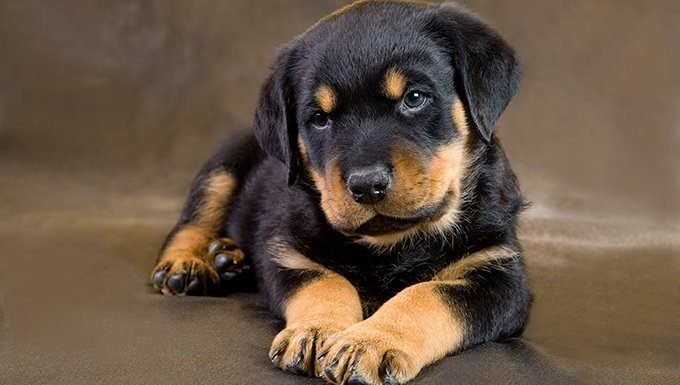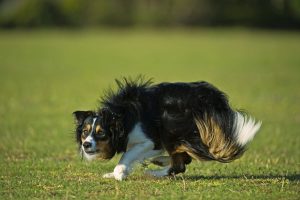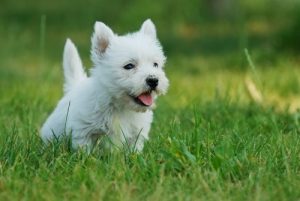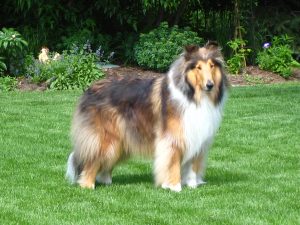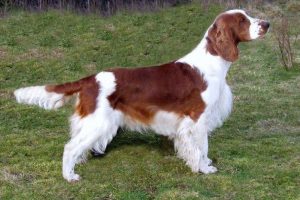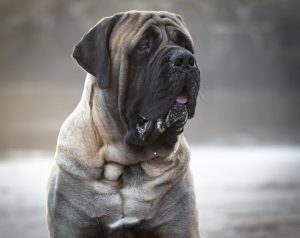Yesterday I received a call from someone asking about house training her Rottweiler puppy. She stated that “Raven” her 4 months old pup is urinating and defecating in her home on a daily basis. In fact, her puppy potty’s in the house far more often than she potty’s outside. The caller was beyond frustrated, and I can’t blame her. No one wants their house to smell like a barn. And no one wants to be continuously cleaning up after their puppy. So let’s talk puppy potty training.
First, there are three parts to house training a puppy (or older dog):
1. Where to go. Pick a place you would like your pup/dog to go. Be sure this area has easy access and is safe. It can also be helpful to pick a place that has minimal distractions (if possible).
2. How to get there. Your pup/dog has to learn a reliable signal to let you know that they need to get to their potty area.
3. How to hold themselves for increasingly longer periods of time if they cannot readily get there. This should be within the puppies age appropriate abilities.
Now there are a few considerations that we need to add in here.
1. Your pup/dog may not eliminate if they are feeling uptight, stressed or frightened. This is the case with “Raven” the puppy mentioned above. Raven had some very unfortunate unsettling experiences outside, straight out of the gate as her people brought her home. She is to afraid to go potty when outside. Her muscles are tight and all she is thinking about is, “I need to get back into the safety of the house!” Your dog must feel relaxed, comfortable and safe in the potty area.
2. Going potty, no matter where it is done, inside on your priceless antique carpet, or outside in the grass, is a self-reinforcing behavior. Yes, that’s right, it is relieving, it feels good, immediately, when one eliminates.
3. There are two “signals” that must be acknowledged and heeded when teaching potty training. The first is the physical signal the pup/dog feels in the body that tells them they must eliminate. The second is the signal (they learn) to give you to get to their potty area when they do need to eliminate.
4. Puppies set a preference as to the surface that they prefer to eliminate on early in life, generally by nine to ten weeks of age. I know some great breeders who actually bring turf into the puppy pen area and start teaching their pups to go on the grass before their forever people ever bring them home. On a not so fun note I knew a breeder in MN who let her pups run around her house in an area that had hard wood floors. She put carpet down for the pups to eliminate on. I think I met with every single person who adopted one of her pups. They were all well breed, social and adorable puppies … who had a strong preference for pottying on carpet! Yes, all pups were successfully outdoor potty trained.
5. Puppies can generally hold themselves for as many hours as they are months old, plus one. So, if your puppy is 3 months old, consider 4 hours to be your puppies max.
6. Urinating often in small amounts or defecating often or having consistently loose stools is not normal. Consult your veterinarian at once.
7. Puppies (and some teenagers) will generally have to potty just after waking from a nap or overnight sleep, just after eating, during times of excitement such as play, or visitors to the home.
So, let’s put this all together.
1. Make going outside fun and safe. Remember pups are new to this world, and the world is new to them.
3. Calmly walk about the area with your pup. Don’t play, just calmly walk about. This will help your pup to focus on sniffing and the task at hand, pottying.
2. Make going potty outside more reinforcing that going potty inside. Take your puppy’s favorite treat, or toy outside with you and keep it inconspicuously hidden on your body so as not to distract them from the task of pottying,
3. Stay calm and quiet until your pup FINISHES urinating or defecating. You do not want to disturb their “flow” and have them stop short. This could lead to “accidents” in the house. Let them finish up.
4. Once your pup has just finished urinating or defecating praise them, then immediately offer a favored treat or play game with a favorite toy.
5. Always reinforce your puppy the moment they finish going potty outside. Waiting until you get back in the house only teaches them they get treats in the house. Timing is everything!
6. Of course to make all this flow, you need to be outside with your puppy. No cheating and watching from the doorway or not all. If you are not present you cannot teach.
7. Set a schedule. This can be very helpful with young puppies or puppies/dogs who are new to your home. Start by taking them out often. Hourly is a good start. As they start to get the hang of the program, and you start to get the hang of your puppy’s natural elimination rhythm, you can adjust.
Let’s talk management.
Really the key to potty training is building a desire in your pup/dog to want to go outside. No pup/dog will ever give you a signal that they need to go outside to potty unless the actually WANT to go outside.
With most pups/dogs, once this first stage is established the second two stages of teaching a signal to go out and building physical duration of holding (in a healthy pup/dog) is easy peazy stuff!
Note: If you have a teenager or adult dog who, despite your best efforts still is not house trained the first thing to do is to consult with your veterinarian to rule out any underlying medical causes. If a medical exam presents no health issues it might be time to consult with a qualified educated and experienced trainer. House training issues in a teenage or adult dog can be signs of anxiety, fear or even confusion in what you want. A qualified trainer can help you figure out the cause of your dog’s lack of house training manners and set you on the right path.
Supervision is a must! Puppies must be supervised. If you are not supervising you cannot teach. By spending the time and effort to watch your pup with an eagle eye, you can catch when they need to potty and quickly but calmly encourage them outside to their appropriate potty area. Having a portable Exercise Pen that you can move throughout the house to wherever you are settled can be a great aid in not only potty training but training in general.
What if your puppy makes a mistake and potty’s in the house? You take a rolled up newspaper and …. hit yourself on the top of your head and say “Why wasn’t I watching my puppy!?” No seriously, no big deal. Accidents happen. This just teaches you to be more diligent in watching your puppy. Just clean it up, be more watchful, and be ready to reinforce your puppy whenever they potty outside.
Peeing and Pooping
Happy Training!
